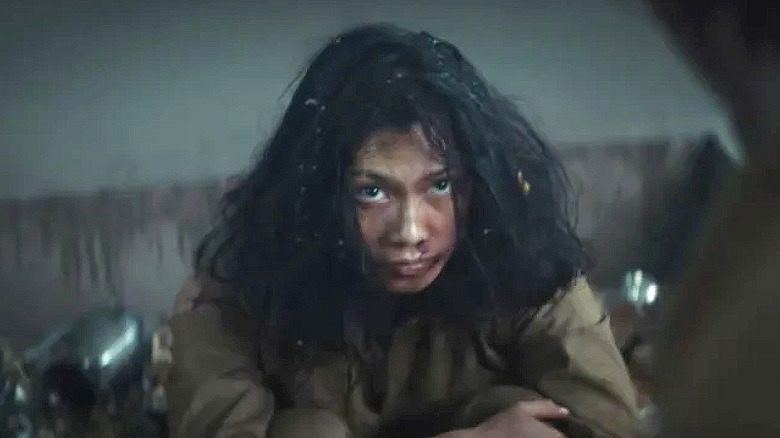The Character From The Platform That Has Fans Scratching Their Heads
"The Platform" is one of the more enigmatic releases to come out of Netflix in recent years. The movie takes place in a facility where residents are fed using a vertically-descending platform filled with food. The people at the top of the building get their choice of food. However, with each subsequent level, there's less and less food to the point where the people at the bottom are lucky to get anything at all (and rarely don't). It's one of the most blatant critiques of capitalism to come out in recent years, following in the footsteps of such films as "Parasite" and "Nomadland."
As a parable disguised as social commentary, the movie is open to interpretation, and one Redditor suggests the film could have a religious bent to it. Redditor u/Tinkertoon points to the special significance of the number 333 and how it could relate to guardian angels. They go on to suggest, "When Goreng reaches lvl 333 and finds the little girl, he comes to the realization that the panna cotta ... is not the message, and the girl is. He thinks he needs to be her bearer (bearer of Christ?), but Trimagasi tells him that she needs no bearer, so the girl 'ascends' to God while Goreng theoretically dies for the sins of the pit dwellers."
The theory further elaborates that the food could be seen as a bounty passed upon by God, and if there's a good in this allegory, there must also be a devil. The only problem is that u/Tinkertoon has a hard time pinning anyone down with that label, offering, "One thing I'm not particularly clear on is the role of [Miharu] — is she supposed to represent the devil, perhaps? Trying to tempt people on each floor to touch her, but killing them instead?" It turns out they're not the only one having difficulty figuring out Miharu's (Alexandra Masangkay) role in all of this.
Miharu could represent everything from vengeance to divine motherhood
Miharu is an intriguing character within "The Platform." While everyone else who resides in this facility merely waits their turn to receive what paltry food they can acquire, she has a different mission in mind. She descends the platform once a month to search for her child to ensure they have enough food to survive. However, one month, Goreng (Iván Massagué) learns that she couldn't have brought a child with her since children aren't allowed in the facility. It's a conundrum that causes Goreng to question further what's real and what's fake, but some clever Redditors think they've figured out what Miharu's purpose in the story is.
Seeing how Miharu can navigate through the levels, which symbolize the different classes of society, u/baconperogies writes, "As for Miharu I thought in a way she represented: 1) vengeance — people in society providing their own sense of justice 2) or mental illness — forgotten people deemed crazy by everyone else; she showed compassion back when the protagonist showed her compassion in their first meeting." Then again, another Redditor — u/ktatum7 — has another idea of what Miharu's purpose in the story could be: "The symbol of the divine feminine is embodied in the way everyone treats and talks about Miharu, versus what Goreng experiences himself. Trimagasi says she's crazy. And Goreng's female [roommate] (sorry don't remember her name) talks s*** about her. I think it's especially telling that the male roommate simply dismisses her, and the female roommate gossips about her."
Miharu is an intriguing addition. Everyone else in the facility looks out for their own well-being. The people in the top levels eat as much as they want without any regard for saving food for those on the bottom. Meanwhile, Miharu has a different agenda; she's actually looking out for someone else's well-being, and her quest leads to Goreng being able to find the child and allowing her to ascend the platform. It's a film with few easy answers, and the more you watch it, the more layers you realize there are.

